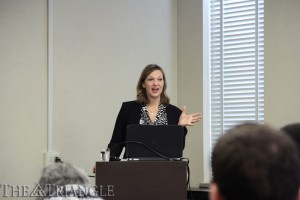Drexel’s The International Area Studies program and the College of Arts and Sciences hosted speaker Anastasia Shown at this month’s International Cafe, “Challenging Our Misperceptions About the African Continent,” Jan. 28 in MacAlister Hall.

Shown is the assistant director of the University of Pennsylvania’s Africa Center, where she organizes outreach programs to educate the public about the continent of Africa. She also gives talks at colleges in the Philadelphia area to promote a greater understanding of Africa and its countries. Shown explained that most people’s perceptions of Africa are laden with false assumptions and prejudices.
“Learning accurate information about the world helps us combat those myths and stereotypes,” Shown said. “By learning about other cultures, you learn that every culture is valuable. This understanding will give you the skills and knowledge that you will need in order to participate in the global workforce.”
According to Shown, because Africa is three times the size of the United States and has the highest population growth in the world, it is more necessary than ever to understand the continent’s relevance in our lives. For example, the United States imports a significant percentage of oil from Africa, and one in every three countries in the United Nations is an African country.
One of the primary misperceptions Shown discussed was the rural nature of the continent. The rates of urbanization in Africa are the highest in the world. By 2025, it is expected that in most African countries, half of the population will be living in cities.
“A lot of Americans are surprised that most Africans have never seen large wildlife, and many see it for the first time in a zoo in Europe or in the United States. This whole concept that people live on safaris is just not accurate,” Shown said.
According to Shown, people also need to avoid perpetuating stereotypes of impoverished and hungry Africans.
“These are the images of Africa that we see all the time. I encourage you to look at it through a global lens. Globally, why are people poor? Multinational corporations and U.S. trade are among the things that are contributing to poverty in Philadelphia as well as in other parts of the world,” she said.
Shown said she credits many of our misperceptions about Africa to the Mercator projection, which is the standard map of the world in United States textbooks. This map, which was made in the 16th century to help ships navigate the sea, is not based on accurately proportioned land mass. Many of the continents and countries on this map are not to scale, and North America in particular is enlarged, which Shown believes to be a problem.
“How we see the world is affected by the images we see growing up,” she said. “These are visual cues that indicate how little we know about the world, especially regions we haven’t studied.”
Shown concluded her talk by recommending the book “Americanah” by Chimamanda Ngozi Adichie, a former Drexel University student. The book tells the story of Adichie’s experiences living in Philadelphia after emigrating from Nigeria to the United States.
“A lot of times you’ll read a book about Africa from someone who is not African, or you hear a talk about Africa from someone like me, who is not African,” Shown said. “It happens, but balance it out. Read books written by Africans and listen to talks given by Africans.”
The International Cafe is a forum at Drexel that hosts globally themed discussions for students, faculty and the community each month.


